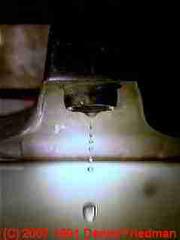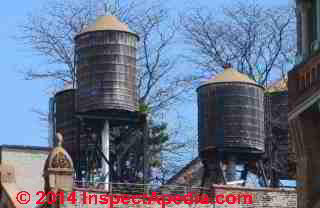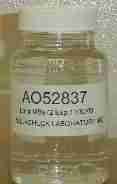 Municipal Water Test
Municipal Water Test
sample parameters if testing a Municipal Water supply - home buyer advice
- POST a QUESTION or COMMENT about testing your community or city water supply.
City, municipal, or community water testing:
Should individuals bother to test such water supplies?
If so why, when, and what tests are typically performed?
InspectAPedia tolerates no conflicts of interest. We have no relationship with advertisers, products, or services discussed at this website.
- Daniel Friedman, Publisher/Editor/Author - See WHO ARE WE?
Private Tests of Community or Municipal Water Supply Quality or Potability or for Contaminants
Normally we would not test water in a property served by a municipal supply, as federal, state, or other regulations require thorough and frequent testing that is more extensive than a private individual is likely to employ.
However for small water systems such as those serving a limited number of homes, and particularly where the water supply system is being privately managed by a local firm or by a local property manager, some screening tests may be appropriate.
This would be particularly true if a review of the history of local testing and water sanitation by the local provider raises questions about the accuracy and thoroughness of the water management company. Be sure to review actual parameters with your home inspector or laboratory: parameters and costs vary.
The water test parameters listed below are typical state testing requirements for municipal water supply testing. Be sure to review actual parameters with your home inspector or laboratory: parameters and costs vary.
Municipal Water Test Paramaters |
| Water Analysis Paramaters for Municipal Water Supply Systems |
| Total Coliform |
| Fecal/E. Coli |
| Calcium |
| Copper |
| Iron |
| Magnesium |
| Manganese |
| Potassium |
| Sodium |
| Alkalinity |
| Chloride |
| Chlorine |
| Color |
| Conductivity |
| Hardness |
| Nitrate |
| Odor |
| pH |
| Sediment |
| Total Dissolved Solids |
| Sulfate |
| Turbidity |
| Lead |
Reasons for Additional Testing of Municipal Water Supplies for Contaminants
Presuming you're in the U.S., federal regulations require very extensive and regular testing of the public water supply.
But there could be an in-building contaminant source from piping, or from a source such as legionnaire's bacteria growth in a hot water tank or other bacterial contamination in a pressure tank or piping. Water conditioner can also be a contaminant reservoirs.
You may want to clean such tanks or treatment equipment and disinfect it as a precautionary measure, then wait 2 weeks or longer (to allow any bacteria to regenerate), then perform at a minimum a bacteria test recommended by your local water test lab.
Discuss with the lab including Giardia testing in your bacteria test result. for an unknown building & situation no one can safely tell you to ignore any concern you express, but finding Giardia in a public water supply would normally be a surprise. But indeed such water quality issues are not just imaginary, as you can read in the following research citations:
Watch out: bactrial contaminants and other contaminants can enter the human body by more means than just drinking water, such as by foods. See Millard (1994) cited below for an example.
Question: advice on testing water in New York City
 I have a friend suffering from ongoing, unexplained medical problems. Her doctors have offered no clear diagnosis, but some of her symptoms have made me suspect the water quality in her apartment building.
I have a friend suffering from ongoing, unexplained medical problems. Her doctors have offered no clear diagnosis, but some of her symptoms have made me suspect the water quality in her apartment building.
She can't afford to pay for testing but I would be happy to on her behalf. Can you recommend a reliable company that provides such a service to Manhattan residents at a reasonable cost? - Anonymous by private email 2017/07/17
Reply:
Any water test lab in NYC (closer to your friend's address is probably less expensive) can either accept a test sample that you collect using sterile bottle(S) they'll give you, or can send someone to collect sample(s).
I do not have a specific water test lab recommendation - except to be sure that you use a lab who is specifically licensed by the NYS Health Department (some out of state labs offer services but are not licensed)
The cost of water testing is quite modest when testing simply for the presence of coliform - a standard private well test - but can soar if you start ordering clusters of test.
Municipal water testing tip: So also get advice from the lab about what sorts of contaminants they have been finding in New York City water so that you have that additional test advice.
New York City's water quality is among the highest among municipalities and would not normally be suspect.
 But local building piping or contamination in the building's hot water supply could result in water that is contaminated.
But local building piping or contamination in the building's hot water supply could result in water that is contaminated.
There is no single test for all possible contaminants so it would make sense to have a reason to be looking for something specific, such as lead (from lead supply pipes or lead soldered-copper pipe joints), or bacteria if a water storage tank (many NYC buildings use a rooftop storage tank to develop building water pressure) is contaminated, or bacteria if hot water supply is contaminated. Legionella could be in the hot water supply or in A/C system condensate.
Water testing tip: It would also make sense to ask your friend's doctor for an opinion about what, if anything, could be in water that could explain, cause, or aggravate the person's illness.
Research on Contaminant in Public Water Supply
- Atherton, F., C. P. S. Newman, and D. P. Casemore. "An outbreak of waterborne cryptosporidiosis associated with a public water supply in the UK." Epidemiology and Infection 115, no. 01 (1995): 123-131.
- Betancourt, Walter Q., and Joan B. Rose. "Drinking water treatment processes for removal of< i> Cryptosporidium</i> and< i> Giardia</i>." Veterinary parasitology 126, no. 1 (2004): 219-234.
- Flanagan, P. A. "Giardia--diagnosis, clinical course and epidemiology. A review." Epidemiology and Infection 109, no. 1 (1992): 1.
- Fraser, G. Graham, and Kenneth R. Cooke. "Endemic giardiasis and municipal water supply." American journal of public health 81, no. 6 (1991): 760-762.
- Hashimoto, Atsushi, Shoichi Kunikane, and Tsuyoshi Hirata. "Prevalence of Cryptosporidium oocysts and Giardia ysts in the drinking water supply in Japan." Water Research 36, no. 3 (2002): 519-526.
- Hayes, Edward B., Thomas D. Matte, Thomas R. O'Brien, Thomas W. McKinley, Gary S. Logsdon, Joan B. Rose, Beth LP Ungar et al. "Large community outbreak of cryptosporidiosis due to contamination of a filtered public water supply." New England Journal of Medicine 320, no. 21 (1989): 1372-1376.
- Jephcott, A. E., N. T. Begg, and I. A. Baker. "Outbreak of giardiasis associated with mains water in the United Kingdom." The Lancet 327, no. 8483 (1986): 730-732.
- Kent, George P., JOEL R. Greenspan, Joy L. Herndon, Lynne M. Mofenson, J. A. Harris, Thomas R. Eng, and Hetty A. Waskin. "Epidemic giardiasis caused by a contaminated public water supply." American journal of public health 78, no. 2 (1988): 139-143.
- LeChevallier, MARK W., William D. Norton, and Ramon G. Lee. "Giardia and Cryptosporidium spp. in filtered drinking water supplies." Applied and Environmental Microbiology 57, no. 9 (1991): 2617-2621.
- LeChevallier, Mark W., William D. Norton, and Ramon G. Lee. "Occurrence of Giardia and Cryptosporidium spp. in surface water supplies." Applied and Environmental Microbiology 57, no. 9 (1991): 2610-2616.
- Levine, W. C., W. T. Stephenson, and G. F. Craun. "Waterborne disease outbreaks, 1986-1988." MMWR. CDC surveillance summaries: morbidity and mortality weekly report. CDC Surveillance Summaries/Centers for Disease Control 39, no. 1 (1990): 1-13.
- Mac Kenzie, William R., Neil J. Hoxie, Mary E. Proctor, M. Stephen Gradus, Kathleen A. Blair, Dan E. Peterson, James J. Kazmierczak et al. "A massive outbreak in Milwaukee of Cryptosporidium infection transmitted through the public water supply." New England journal of medicine 331, no. 3 (1994): 161-167.
- Millard, Peter S., Kathleen F. Gensheimer, David G. Addiss, Daniel M. Sosin, Geoffrey A. Beckett, Agnes Houck-Jankoski, and Arlene Hudson. "An outbreak of cryptosporidiosis from fresh-pressed apple cider." Jama 272, no. 20 (1994): 1592-1596.
- Rose, Joan B., Charles P. Gerba, and Walter Jakubowski. "Survey of potable water supplies for Cryptosporidium and Giardia." Environmental Science & Technology 25, no. 8 (1991): 1393-1400.
- Rose, Joan B., Charles N. Haas, and Stig Regli. "Risk assessment and control of waterborne giardiasis." American journal of public health 81, no. 6 (1991): 709-713.
...
Continue reading at CHLORINE IN DRINKING WATER or select a topic from the closely-related articles below, or see the complete ARTICLE INDEX.
Or see these
Recommended Articles
- WATER TESTING ADVICE for home buyers and building owners: water contaminants, water test procedures, well shock procedures, preventing drinking water contamination
- PUBLIC vs PRIVATE WATER
- WATER TESTS for CONTAMINANTS - home
- WATER QUALITY TEST CHOICES & WATER TEST FEES - home
Suggested citation for this web page
MUNICIPAL WATER TEST PARAMETERS at InspectApedia.com - online encyclopedia of building & environmental inspection, testing, diagnosis, repair, & problem prevention advice.
Or see this
INDEX to RELATED ARTICLES: ARTICLE INDEX to WATER TESTING
Or use the SEARCH BOX found below to Ask a Question or Search InspectApedia
Ask a Question or Search InspectApedia
Questions & answers or comments about testing your community or city water supply.
Try the search box just below, or if you prefer, post a question or comment in the Comments box below and we will respond promptly.
Search the InspectApedia website
Note: appearance of your Comment below may be delayed: if your comment contains an image, photograph, web link, or text that looks to the software as if it might be a web link, your posting will appear after it has been approved by a moderator. Apologies for the delay.
Only one image can be added per comment but you can post as many comments, and therefore images, as you like.
You will not receive a notification when a response to your question has been posted.
Please bookmark this page to make it easy for you to check back for our response.
IF above you see "Comment Form is loading comments..." then COMMENT BOX - countable.ca / bawkbox.com IS NOT WORKING.
In any case you are welcome to send an email directly to us at InspectApedia.com at editor@inspectApedia.com
We'll reply to you directly. Please help us help you by noting, in your email, the URL of the InspectApedia page where you wanted to comment.
Citations & References
In addition to any citations in the article above, a full list is available on request.
- When Technology Fails, Matthew Stein, Chelsea Green Publisher, 2008,493 pages. ISBN-10: 1933392452 ISBN-13: 978-1933392455, "... how to find and sterilize water in the face of utility failure, as well as practical information for dealing with water-quality issues even when the public tap water is still flowing". Mr. Stein's website is www.whentechfails.com/
- Cheating on water tests: Testing Water for Real Estate Transactions - make sure your water test is valid
- Drinking Water Contaminant Levels - Maximum Allowed
- Drinking Water Supply, Contamination Levels, Water Testing Procedures
- Drinking Water Testing Advice for home buyers home owners home inspectors
- Interpreting Drinking Water Test Results and Correcting Unsatisfactory Water
- Lead Contamination in Drinking Water: Testing & Correction - Advice
- Lead Testing & Correcting Contamination from Lead Water Supply Lines/Entry Mains - Lead Pipe Problems/Advice
- Life Expectancy of Water Pumps - Well Pumps: how long should a water pump last? What affects pump life?
- Life Expectancy of Wells & Water Tanks how long should a water well and its components last?
- Shock or Chlorinate a Well, or sterilizing building water piping, How to - Procedure for Shocking a Well to (temporarily or maybe longer) "Correct" Bacterial Contamination
- Grove Electric, Typical Shallow Well One Line Jet Pump Installation [PDF], Grove Electric, G&G Electric & Plumbing, 1900 NE 78th St., Suite 101, Vancouver WA 98665 www.grovelectric.com - web search -7/15/2010 original source: http://www.groverelectric.com/howto/38_Typical%20Jet%20Pump%20Installation.pdf
- Grove Electric, Typical Deep Well Two Line Jet Pump Installation [PDF], Grove Electric, G&G Electric & Plumbing, 1900 NE 78th St., Suite 101, Vancouver WA 98665 www.grovelectric.com - web search -7/15/2010 original source: http://www.groverelectric.com/howto/38_Typical%20Jet%20Pump%20Installation.pdf
- Water Tests & Fees this water test fee schedule applies when testing is combined with other onsite building inspection services
- CONTAMINANT CLASSES, in WATER & links to home buyer advice about water testing, drinking water, water supply
- Our recommended books about building & mechanical systems design, inspection, problem diagnosis, and repair, and about indoor environment and IAQ testing, diagnosis, and cleanup are at the InspectAPedia Bookstore. Also see our Book Reviews - InspectAPedia.
- Crystal Clear Supply provides portable ceramic water filter purifiers and portable reverse osmosis water treatment equipment - see http://www.crystalclearsupply.com/category_s/7.htm
- Handbook of Disinfectants and Antiseptics, Joseph M. Ascenzi (Editor), CRC, 1995, ISBN-10: 0824795245 ISBN-13: 978-0824795245 "The evaluation of chemical germicides predates the golden age of microbiology..." -
This well-focused, up-to-date reference details the current medical uses of antiseptics and disinfectants -- particularly in the control of hospital-acquired infections -- presenting methods for evaluating products to obtain regulatory approval and examining chemical, physical, and microbiological properties as well as the toxicology of the most widely used commercial chemicals. - Principles and Practice of Disinfection, Preservation and Sterilization (Hardcover)
by A. D. Russell (Editor), W. B. Hugo (Editor), G. A. J. Ayliffe (Editor), Blackwell Science, 2004. ISBN-10: 1405101997, ISBN-13: 978-1405101998.
"This superb book is the best of its kind available and one that will undoubtedly be useful, if not essential, to workers in a variety of industries. Thirty-one distinguished specialists deal comprehensively with the subject matter indicated by the title ... The book is produced with care, is very readable with useful selected references at the end of each chapter and an excellent index. It is an essential source book for everyone interested in this field. For pharmacy undergraduates, it will complement the excellent text on pharmaceutical microbiology by two of the present editors."
The Pharmaceutical Journal: "This is an excellent book. It deals comprehensively and authoritatively with its subject with contributions from 31 distinguished specialists. There is a great deal to interest all those involved in hospital infection ... This book is exceptionally well laid out. There are well chosen references for each chapter and an excellent index. It is highly recommended." The Journal of Hospital Infection.: "The editors and authors must be congratulated for this excellent treatise on nonantibiotic antimicrobial measures in hospitals and industry ... The publication is highly recommended to hospital and research personnel, especially to clinical microbiologists, infection-control and environmental-safety specialists, pharmacists, and dieticians."
New England Journal of Medicine: City Hospital, Birmingham, UK. Covers the many methods of the elimination or prevention of microbial growth. Provides an historical overview, descriptions of the types of antimicrobial agents, factors affecting efficacy, evaluation methods, and types of resistance. Features sterilization methods, and more. Previous edition: c1999. DNLM: Sterilization--methods. - In addition to citations & references found in this article, see the research citations given at the end of the related articles found at our suggested
CONTINUE READING or RECOMMENDED ARTICLES.
- Carson, Dunlop & Associates Ltd., 120 Carlton Street Suite 407, Toronto ON M5A 4K2. Tel: (416) 964-9415 1-800-268-7070 Email: info@carsondunlop.com. Alan Carson is a past president of ASHI, the American Society of Home Inspectors.
Thanks to Alan Carson and Bob Dunlop, for permission for InspectAPedia to use text excerpts from The HOME REFERENCE BOOK - the Encyclopedia of Homes and to use illustrations from The ILLUSTRATED HOME .
Carson Dunlop Associates provides extensive home inspection education and report writing material. In gratitude we provide links to tsome Carson Dunlop Associates products and services.

